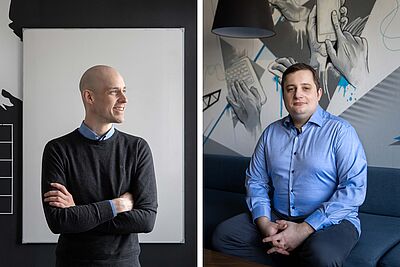Large data centres worldwide are increasingly affected by cyberattacks: Last year, among others, the three largest German computers, the Hawk in Stuttgart, the Supermuc in Garching, and the Juwels in Jülich were put out of action by a hacker attack. The recently founded company "immune" wants to prevent such cases; the team from Bochum is developing a more secure solution against attacks and malware from data centres and was accompanied in the application process by the incubator Cube 5 at the Ruhr University Bochum. Founders Philipp Deppenwiese and Kai Michaelis outline how they came up with their innovative idea based on trusted computing technology and how the two are using their expertise to close the gaping security hole in the future in an interview with Cube 5.
Where did you two meet?
Deppenwiese/Michaelis: We met at "Sirrix Security Technologies" in 2013. At the time, Kai was an IT security student at the Ruhr University in Bochum and Philipp was a trained IT specialist; we worked as developers at the cybersecurity startup Sirrix, which is now part of Rohde & Schwarz Cybersecurity.
How did your idea come about?
Philipp Deppenwiese: The problems with the firmware and the complex integration gave us the idea early on. Kai was working on a Trusted Computing Module (TPM 2.0
compliance suite) from the Trusted Computing Group and I took care of embedding Remote Attestation in various Sirrix products.
What experience do you bring to the table?
Deppenwiese/Michaelis: We are both specialists in trusted computing and firmware security. As a software developer at 9elements, a Bochum-based software development agency, Philipp founded the cybersecurity department there in 2018. Under his leadership, the department grew by a seven-figure annual turnover within three years. Philipp also initiated the internationally famous Open Source Firmware Conference, through which we have now also built up an extensive network for immune. On the other hand, Kai will be in charge of product development and research; he is our expert on technical issues.
What differentiates your solution from the competition?
Michaelis: The "immune Guard" product implements a large number of trust anchors to support a large number of platforms, making it easy to integrate into our users' infrastructure. We also offer this solution with a firmware analysis component as a software-as-a-service. The ease of use of the complex trusted computing technology differentiates our product from other offerings on the market.
Where do you see your company at the end of the funding period?
Deppenwiese/Michaelis: We would like to expand our customer base in the B2B sector and implement our "immune Guard" product focusing on user-friendliness. It should protect against so-called "supply chain attacks" on a software basis, cost-effective and easy to use. Our sales and development team is currently growing, which we will coordinate in the best possible way this year.
BMBF funding program "StartUpSecure"
In addition to the initial consultation in the open office hours, Cube 5 - as one of four incubators in Germany funded by the Federal Ministry of Education and Research (BMBF) - advises founding teams and startups from the IT security sector throughout Germany on the BMBF funding program "StartUpSecure". Consultations by Cube 5 are free of charge and strictly confidential.
Further information:
https://cube-five.de/startupsecure
https://www.forschung-it-sicherheit-kommunikationssysteme.de/projekte/immune
General note: In case of using gender-assigning attributes we include all those who consider themselves in this gender regardless of their own biological sex.


